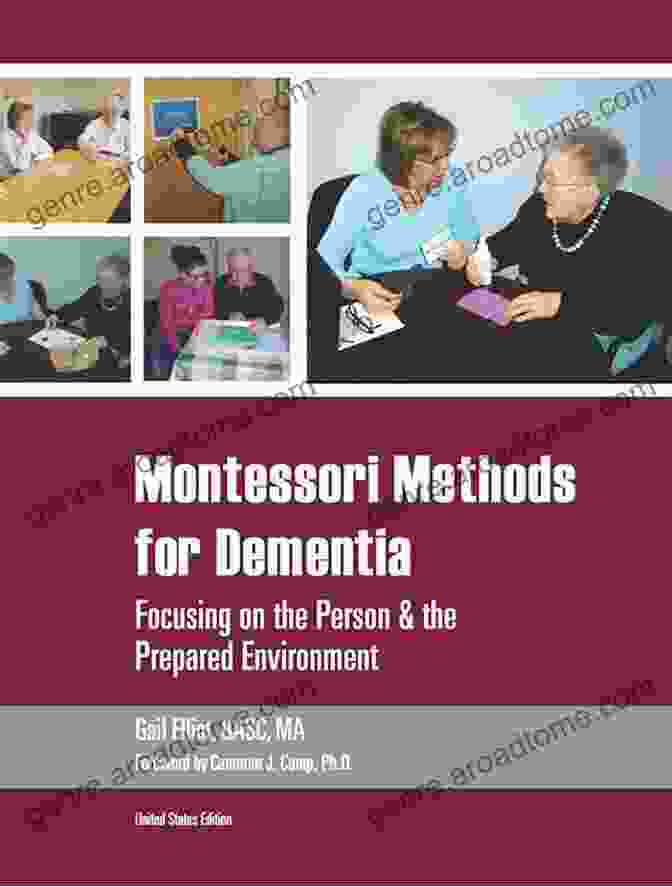The Montessori Method for Positive Dementia Care: A Revolutionary Approach to Enhance Well-being and Dignity


4.5 out of 5
| Language | : | English |
| File size | : | 7925 KB |
| Screen Reader | : | Supported |
| Print length | : | 288 pages |
| Lending | : | Enabled |
Dementia is a challenging condition that affects millions of people worldwide. Traditional approaches to dementia care often focus on managing symptoms and providing support, but they may not fully address the unique needs of individuals with dementia.
The Montessori Method for Positive Dementia Care offers a revolutionary approach that empowers individuals with dementia to live fulfilling and meaningful lives. Based on the principles of the Montessori Method, this approach focuses on creating a supportive and respectful environment that promotes independence, self-esteem, and well-being.
In this article, we will explore the key principles of the Montessori Method for Positive Dementia Care, discuss its benefits for individuals with dementia and their caregivers, and provide practical tips on how to implement this approach in your own caregiving setting.
The Montessori Method: An Overview
The Montessori Method is an educational approach developed by Dr. Maria Montessori in the early 20th century. It is based on the belief that children have a natural desire to learn and that they learn best through hands-on experiences in a supportive environment.
The Montessori Method has been successfully used in educational settings for over a century. In recent years, it has been increasingly used in dementia care as a way to promote independence, self-esteem, and well-being among individuals with dementia.
The Montessori Method for Positive Dementia Care: Key Principles
The Montessori Method for Positive Dementia Care is based on the following key principles:
- Respect for the individual: Individuals with dementia should be treated with respect and dignity. Their needs, preferences, and abilities should be taken into account when making decisions about their care.
- Independence: Individuals with dementia should be encouraged to maintain as much independence as possible. They should be given opportunities to make choices, participate in activities, and take care of themselves.
- Meaningful activities: Individuals with dementia should have access to meaningful activities that engage their minds, bodies, and spirits. These activities should be tailored to their individual interests and abilities.
- Supportive environment: The environment in which individuals with dementia live should be supportive and respectful. It should be free from clutter and noise, and it should provide opportunities for socialization and interaction.
Benefits of the Montessori Method for Positive Dementia Care
The Montessori Method for Positive Dementia Care has been shown to have a number of benefits for individuals with dementia and their caregivers, including:
- Improved quality of life: Individuals with dementia who participate in Montessori-based activities report an improved quality of life. They are more likely to be engaged in meaningful activities, have a greater sense of purpose, and experience less stress and anxiety.
- Reduced caregiver burden: Montessori-based activities can help to reduce caregiver burden by providing individuals with dementia with opportunities to participate in meaningful activities and by creating a more supportive and respectful environment.
- Increased independence: Montessori-based activities can help individuals with dementia to maintain their independence by encouraging them to make choices, participate in activities, and take care of themselves.
- Improved cognitive function: Montessori-based activities can help to improve cognitive function in individuals with dementia by providing opportunities for mental stimulation and by promoting social interaction.
- Reduced behavioral problems: Montessori-based activities can help to reduce behavioral problems in individuals with dementia by providing them with meaningful activities and by creating a supportive environment.
How to Implement the Montessori Method in Dementia Care
There are a number of ways to implement the Montessori Method in dementia care. Some tips include:
- Create a supportive environment: Make sure the environment in which individuals with dementia live is clutter-free, noise-free, and provides opportunities for socialization and interaction.
- Provide meaningful activities: Offer individuals with dementia a variety of meaningful activities that engage their minds, bodies, and spirits. These activities should be tailored to their individual interests and abilities.
- Encourage independence: Encourage individuals with dementia to maintain as much independence as possible. Give them opportunities to make choices, participate in activities, and take care of themselves.
- Respect the individual: Always treat individuals with dementia with respect and dignity. Take their needs, preferences, and abilities into account when making decisions about their care.
- Seek professional help: If you are struggling to implement the Montessori Method in your own caregiving setting, consider seeking professional help from a geriatric care manager or other qualified professional.
The Montessori Method for Positive Dementia Care is a revolutionary approach that can help to improve the quality of life for individuals with dementia and their caregivers. By creating a supportive and respectful environment, providing meaningful activities, and encouraging independence, the Montessori Method can help individuals with dementia to live fulfilling and meaningful lives.
If you are interested in learning more about the Montessori Method for Positive Dementia Care, I encourage you to contact a qualified professional for more information.
References
- Camp, C. (2013). The Montessori Method for Alzheimer's Care.
- Gaugler, J. E., Kane, R. A., & Kane, R. L. (2009). Dementia care: The Montessori way.
- Volicer, L., & Harper, M. B. (2012). The person-centered care approach in dementia care.
4.5 out of 5
| Language | : | English |
| File size | : | 7925 KB |
| Screen Reader | : | Supported |
| Print length | : | 288 pages |
| Lending | : | Enabled |
Do you want to contribute by writing guest posts on this blog?
Please contact us and send us a resume of previous articles that you have written.
 Book
Book Novel
Novel Page
Page Chapter
Chapter Text
Text Story
Story Genre
Genre Reader
Reader Library
Library Paperback
Paperback E-book
E-book Magazine
Magazine Newspaper
Newspaper Paragraph
Paragraph Sentence
Sentence Bookmark
Bookmark Shelf
Shelf Glossary
Glossary Bibliography
Bibliography Foreword
Foreword Preface
Preface Synopsis
Synopsis Annotation
Annotation Footnote
Footnote Manuscript
Manuscript Scroll
Scroll Codex
Codex Tome
Tome Bestseller
Bestseller Classics
Classics Library card
Library card Narrative
Narrative Biography
Biography Autobiography
Autobiography Memoir
Memoir Reference
Reference Encyclopedia
Encyclopedia Kindle Edition With Audio Video
Kindle Edition With Audio Video Kristie Good
Kristie Good Jillian Kingsford Smith
Jillian Kingsford Smith Robert W Holt
Robert W Holt Sumanta Guha
Sumanta Guha Susan I Buchalter
Susan I Buchalter Landmark Publications
Landmark Publications Lance Halvorsen
Lance Halvorsen Kristi Mckim
Kristi Mckim Lancelot Schaubert
Lancelot Schaubert Philip Drucker
Philip Drucker Trena M Paulus
Trena M Paulus Liv Larsson
Liv Larsson Kym Jackson
Kym Jackson Tom Laszewski
Tom Laszewski P K Butler
P K Butler P D Ball
P D Ball Vikki Lawrence
Vikki Lawrence Lane Lasater
Lane Lasater Val Wilson
Val Wilson
Light bulbAdvertise smarter! Our strategic ad space ensures maximum exposure. Reserve your spot today!

 Gabriel MistralMicrogeometry Sensitivity Relations in Materials Science: Delving into the...
Gabriel MistralMicrogeometry Sensitivity Relations in Materials Science: Delving into the...
 Vic ParkerHuman Body Anatomy by Knowledge Flow: A Masterful Exploration of Our Physical...
Vic ParkerHuman Body Anatomy by Knowledge Flow: A Masterful Exploration of Our Physical...
 Forrest BlairDiscover the Enchanting Tale of "Distant Heart": A Journey of Love, Loss, and...
Forrest BlairDiscover the Enchanting Tale of "Distant Heart": A Journey of Love, Loss, and... Jason HayesFollow ·18.5k
Jason HayesFollow ·18.5k Deion SimmonsFollow ·2.9k
Deion SimmonsFollow ·2.9k Dawson ReedFollow ·3.3k
Dawson ReedFollow ·3.3k Devin RossFollow ·12.9k
Devin RossFollow ·12.9k Eugene PowellFollow ·13.2k
Eugene PowellFollow ·13.2k Marc FosterFollow ·19.4k
Marc FosterFollow ·19.4k Devin CoxFollow ·13k
Devin CoxFollow ·13k Marcel ProustFollow ·8.8k
Marcel ProustFollow ·8.8k

 Charlie Scott
Charlie ScottQuickBooks 2024 In Depth: Your Essential Guide to...
About the Book Are you ready to elevate...

 D'Angelo Carter
D'Angelo CarterUnlocking the Mysteries of Primitive Economies: A Journey...
Prepare to embark on an...

 Milton Bell
Milton BellUnveiling the Secrets of Agile Coaching: A Comprehensive...
In the ever-evolving landscape...

 Tyler Nelson
Tyler NelsonUnveiling the Treasures of Italy: A Journey of Discovery...
Embark on an enchanting expedition into the...
4.5 out of 5
| Language | : | English |
| File size | : | 7925 KB |
| Screen Reader | : | Supported |
| Print length | : | 288 pages |
| Lending | : | Enabled |










